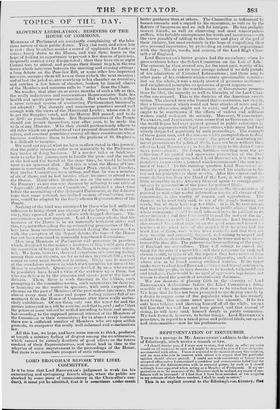LORD BROUGHAM BEFORE THE LIBEL COMMITTEE.
IF it be true that Lard BROUGHAM'S judgment is weak (as his extenuating and apologizing friends allege, when the public are shocked by some piece of inconsistency in the Chancellor's con- duct), it must yet be admitted, that it is sometimes under much
better guidance than,at others. The Chancellor is influenced by honest counsels and a regard to his reputation, as well as by the
flattery of littogers-on and an itch for intrigue. He has probablt sincere friends, us well as chattering and most uascrupulous putters, who foolishly misrepresent his words and intentions—with the view possibly of adding to the honour and glory of the god of their idolatry, but most certainly in the hope of magnifying their own personal importance, by pretending an intimate acquaintance with the thoughts, words, and actions, of the Lord High Chan- cellor of England. Lord BROUGH mu's better genius had the ascendancy when he gave evidence before the Select Committee on the Law of Libol.
The opinions he then avowed are, for the most part, worthy of Ilk best days. 1Ve do not (it were strange indeed if we did) partakt of his admiration of Criminal Informations ; and there may be other parts of his evidence which contain questionable opinions; but on the whole, it was a manly uvowal of generous sentiments: and enlightened principles oa questions of great importance. In his testimony to the worthlessness of Government • prosecu- tions for libel, the sagacity as well as liberality of the Lord Chan- cellor was evinced. This is the doctrine of the American consti- tution. The shrewd men who framed that constitution, saw clearly, that a Government which could not bear attacks of acute and in-
telligent adversaries, ought not to exist; and that, ti fortiori, it
ought to be overthrown if the efforts of violent and. seditious writers could en:longer its security. Moreover, Weemtenecte,
PRA NKL1 N, and .1 erreesoN, were aware that no Government since the world began had ever gained ground in public estimation br opposing argunteuts with legal proseoutions,while many had been utterly stripped of popularity by such proceedings. The example of these great men, and the reasons yi hich prompted them to deny to the Gm-eminent of their eternity the power of instituting nhzaoi prosecutims Ins political libels, have not been without their effect oil Lord linouon ; as his die c: reply to Sir JOHN CAMP- BELL proves cleat ly. Sir J °tor, doubtless smarting from the se- collection or his partial and oppressive prosecution of the Tri:..! San, and its consequAlces, asked Led Bnouonesz, if it were net just ifleb'e to prosecute it journal which recommetuled the non-pay - ment of taxer; ? To this miming question Lord Buotienen re-
turned a prompt negative, and tIvis showed his readiness to fon leo. out his principles to their results. After this slime, :Ind de- cisive deelin at en, front the Head of the Law, it will require let little intrepidity it, the .Attorney-General vain to outrage opeffel by prosecutrittlii of the press for pelitical libels.
Lord Beolcon se's will iogness to prom Ato the dissomiaation of political as well ether useful informatien among all classes of the community, is also worthy of remark end approbation. The danger, as he most truly said, is not of the eeopls learnine too much, but of their knoeieg too little. It is fit, he maiotainel,
that the pe.•ple should take an interest, in public itiatirs; that Alai whole community n eel be well infonnod upoa its I:Wit:cal as its
other interest that t le: acted to read the news of the da:,
aed the dciri cs 1,i ;honker of Parliatnont. Lord Bt uconee
also avoweil hi.: net foot rens Ate no 11:e g,:o:1 sense awl honest
tent Mt: s or of the people: that lie weer had 111e
least flaw 01 them. c■e:i :leo no-t excited : and that they ate
very morally and peaceably disposed, nod willing to respect nod submit to these alaive 1 hem. Nothing can be truer and more ineete troves! ible time this. The patience and long-su tiering of the peerlte
of England are mitt venous. They w.II subunit to almost any thiag for the sake et a quiet life; and their reverence for rank and station is still, in spite of all the injuries they have revel% frem the corrupt and igianant pottMn of the Oligarchy, such :t3 i3 no- where else to lie ft mud among civilized nations. If the it tanks wore to adopt Lord Beo UGH A 7•:'S and liberal sentimeors, and treat the people, as they deserve to be treated, with coutidease. and kinduess, those would be no need of oppressive legislation, nor reason to dread the growth of revolutionary doctrines. We are desiroue of placing faith in the eincerity of Loot BROUGH AM'S declarations before the Libel Committee; being sensible of the importance in that case to be attached to them. We hope that lie has not been prompted to the display inertly by a desire to regain some of the popularity which he has recently been losing. his actions must prove his sincerity. Ube has only been talking and showing himself oil' all the while, we can tell him that his cad has not been gained, and that instead of rising, he will have sunk himself deeply in public estimation. 1Ve look forward, however, to better things. Lord BROUGHAM'S principles, in regard to a taxed press and political libels, arc same' and statesmanlike—now for his performances.






















 Previous page
Previous page